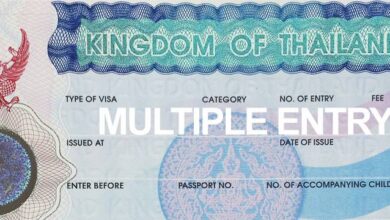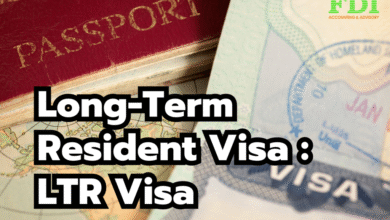How to Get a Long Term Visa for Thailand: Complete 2025 Guide
Thailand, known for its stunning beaches, vibrant street life, and welcoming culture, continues to be one of the most attractive destinations for long-term stays in Southeast Asia. Whether you’re a digital nomad, How to Get a Long Term Visa for Thailand: Complete 2025 Guide a retiree, an entrepreneur, or just someone in love with Thai culture, getting a long term visa thailand can open the doors to a new chapter in your life.
In this comprehensive 2025 guide, we’ll break down everything you need to know about how to get a long-term visa for Thailand, including the types of visas available, eligibility criteria, application procedures, costs, and legal requirements. Let’s dive into the ultimate guide for staying longer in the Land of Smiles.
Why Consider a Long Term Visa for Thailand?
Thailand offers much more than a holiday experience. With a low cost of living, high-quality healthcare, a wide variety of lifestyle options, and a community of expats from around the world, it’s no surprise that many are opting to stay long-term. A long-term visa allows you to:
-
Avoid the hassle of frequent border runs or visa renewals
-
Establish residency for retirement or work
-
Open bank accounts and rent long-term housing
-
Enroll in Thai language or culture programs
-
Enjoy more freedom and stability as a legal resident
Types of Long Term Visas in Thailand (2025)
As of 2025, Thailand offers several types of long-term visas. Choosing the right visa depends on your purpose of stay.
1. Retirement Visa (Non-Immigrant O or O-A)
For individuals aged 50 and above.
Key Requirements:
-
Age 50+
-
Bank account with at least 800,000 THB in Thailand or a monthly income of 65,000 THB
-
Police clearance certificate (for O-A)
-
Health insurance (for O-A visa)
Validity:
-
1 year, renewable annually
-
O-A visa can be applied from outside Thailand; O visa is for those already inside
2. Marriage Visa (Non-Immigrant O)
For foreign nationals married to Thai citizens.
Key Requirements:
-
Legal marriage to a Thai citizen
-
Bank deposit of 400,000 THB or income of 40,000 THB/month
-
Marriage certificate and photos proving relationship
Validity:
-
1 year, renewable annually
3. Elite Visa (Thailand Privilege Card)
A premium option for high-net-worth individuals.
Key Benefits:
-
5 to 20 years of residency
-
No need to leave Thailand frequently
-
VIP airport services, concierge, and health checkups
Fees (2025 updated):
-
Starting at 900,000 THB for 5 years
-
Up to 2,500,000 THB for 20 years
4. Education Visa (Non-Immigrant ED)
For students enrolled in recognized Thai institutions.
Eligibility:
-
Enrollment in Thai language schools, universities, or Muay Thai academies
-
Required documents: acceptance letter, tuition payment, course schedule
Validity:
-
3 months initially, extendable to 1 year
5. Long-Term Resident Visa (LTR Visa)
Launched for high-potential foreigners such as:
-
Wealthy Global Citizens
-
Wealthy Pensioners
-
Work-from-Thailand Professionals (digital nomads)
-
Highly Skilled Professionals
Key Features:
-
10-year validity
-
Tax incentives
-
Permission to work in Thailand
Eligibility:
-
Income and asset requirements vary per category
-
Health insurance required
Step-by-Step Application Process
Regardless of the visa type, here are the general steps involved in obtaining a long-term visa for Thailand.
Step 1: Choose the Right Visa
Determine your reason for staying and pick a visa that matches your profile (retirement, work, education, etc.).
Step 2: Gather the Required Documents
Typical documents include:
-
Valid passport (minimum 6 months validity)
-
Recent passport-sized photos
-
Proof of financial status (bank statements or income proof)
-
Health and insurance certificates (for specific visas)
-
Application form (TM.7 or online equivalent)
-
Marriage or education certificates (if applicable)
Step 3: Apply at a Thai Embassy or Consulate
You can apply for a long-term visa:
-
Outside Thailand: At any Thai embassy or consulate
-
Inside Thailand: Convert a tourist visa to a long-term visa through Thai Immigration
Step 4: Visa Fee Payment
Visa fees vary based on type and duration:
-
Non-Immigrant O or ED: 2,000 to 5,000 THB
-
Elite Visa: One-time fee from 900,000 THB+
-
LTR Visa: 50,000 THB for 10 years
Step 5: Receive Visa & Travel to Thailand
Once approved, you can travel to Thailand with the visa stamped in your passport.
Step 6: Complete 90-Day Reporting
Long-term visa holders must report their current address to Thai immigration every 90 days. This can be done:
-
In-person at immigration
-
Online (if eligible)
-
Through an agent
Financial Requirements (2025)
Financial proof is crucial for long-term visa approvals. Here’s what you need:
| Visa Type | Bank Deposit | Monthly Income |
|---|---|---|
| Retirement Visa | 800,000 THB | 65,000 THB |
| Marriage Visa | 400,000 THB | 40,000 THB |
| LTR Visa (Pensioner) | $80,000/year | N/A |
| Education Visa | Tuition paid | N/A |
Note: Exchange rates may affect minimum amounts for foreign currencies.
Health Insurance Requirements
Since 2020, Thailand has made health insurance mandatory for certain long-term visas (especially retirement and O-A visas). As of 2025:
Minimum Coverage:
-
Outpatient: 40,000 THB
-
Inpatient: 400,000 THB
You can purchase Thai insurance from:
-
Thai General Insurance Association (TGIA)
-
Approved international providers
Common Mistakes to Avoid
-
Applying Too Late: Visa processing can take weeks. Apply at least 30 days before your travel date.
-
Insufficient Funds: Make sure your financial proof matches the visa requirement.
-
Missing 90-Day Reports: Failure to report can result in fines or cancellation of your visa.
-
Overstaying: Overstays incur fines (500 THB/day) and possible blacklisting.
-
Using Unlicensed Agents: Only work with registered immigration consultants or go directly through official channels.
Visa Extensions & Renewals
Most long-term visas in Thailand are renewable if you continue to meet the eligibility requirements. The renewal process typically involves:
-
Re-submitting financial proof
-
Updated insurance certificate (if applicable)
-
New photos and TM.7 form
-
Fee payment (1,900 THB/year for most)
Extensions must be applied before your visa expires to avoid overstays.
Can You Work on a Long Term Visa?
Work rights depend on the visa type:
-
LTR Visa: Includes work permit eligibility
-
Marriage Visa: Work permit allowed if employer sponsors it
-
Retirement & Education Visas: No work allowed
-
Elite Visa: Not a work visa, though business networking is permitted
To work legally in Thailand, you will need a work permit issued by the Ministry of Labour.
Benefits of Long-Term Residency in Thailand
-
Access to high-quality yet affordable healthcare
-
Deep cultural immersion
-
Low cost of living
-
Community of expats and digital nomads
-
Great connectivity to other Asian countries
Final Thoughts
Getting a long-term visa for Thailand in 2025 is easier and more structured than ever before—especially with new options like the LTR Visa and expanded privileges for retirees and digital professionals.
The key is to plan early, ensure all your documents are in order, and select the visa that best suits your lifestyle and goals. Whether you’re looking to retire peacefully by the beach, run a business in Bangkok, or study the Thai language in Chiang Mai, Thailand welcomes you to stay longer and live better.





